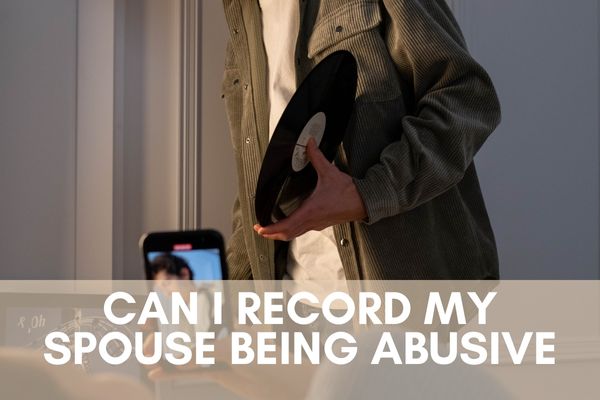Can I record my spouse being abusive? Monitoring conversations have become increasingly familiar with modern technology. However, this technology is advancing rapidly, making it difficult for people to stay on top of their rights and the law in this area.
Can I record my spouse being abusive?
Knowing where to turn if your partner is mistreating you can be challenging. You don’t want to tell anyone because you’re too terrified, and you’re not sure you can trust your closest friends to keep the abuse a secret until you figure out how to protect your family.
So, how can you gather proof of abuse without making your spouse think otherwise? You might be able to rely on yourself with some preparation and a cell phone.
Establishing a new email address distinct from your primary account is the first step in gathering proof of abuse. Additionally, it should have a password you’ve never used before and that your spouse can’t figure out.
You should send images, emails, and other data showing the abuse to this address. This not only conceals the evidence from prying eyes, it is also reachable from anywhere in the world, and all your messages will be time-stamped by default.
Cell phones are beneficial for documenting abuse, but they may also be dangerous if your spouse analyses your text and call history. Delete any images, audio files, or text after sending them to a different email address.
They face the danger of being discovered if you upload them to your computer as a backup. A better choice could be to store the photos on an easily removable and covert external disc, like a thumb drive or jump drive.
Whether recordings of private conversations can be admissible in court as evidence in the ACT is a question faced by many people who find themselves involved in accidents, workplace disputes, and other legal issues.
Unfortunately, the answer isn’t always obvious, and it can be challenging to understand the rules.
In general, unless you are party to a private conversation, it is unlikely that you will be able to use the recording as evidence in court.
Answering The Question
As thoughts turn towards divorce, tempers can flare, and people may behave in ways they usually would not be proud of, even in a relatively amicable situation.
Of course, a spouse’s bad behaviour—ranging from neglect of household duties to infidelity to abusive actions—may well have begun long before the divorce and may well be the reason for it.
In seeking a favourable divorce settlement that compensates you for violations of the marriage contract and shields you from your spouse’s ongoing bad behaviour, you will want evidence to bolster your claims.
In a world of smartphones, where everyone has a video camera and a broadcasting station in their pockets, you may be tempted to record your spouse’s bad behaviour.

Can Audio/Video Recording Suffice As Evidence Of Abuse?
A tape or video recording constitutes a “document,” It is therefore subject to the same rules regarding admissibility.
Recording may be tangible evidence when presented to show what was recorded.
It will constitute hearsay in which you are trying to establish the truth of what was said and will not commonly be accepted unless it falls under one of the exceptions to the “rumour rule.”
A video recording of, for example, the operation of a machine involved in an accident will constitute objective evidence.
It is more convenient than the court going to the building to view the mechanism.
The admissibility of such recordings depends on their suitability, and the defence may object to them because the recording is materially different from the case’s merits.
For example, the mechanism has been modified between the charge date and the recording.
When witnesses see a video recording of a crime, it is not different from witnessing the crime itself.
These witnesses can provide evidence of what they saw on the video screen to the court.
If a statement on tape is admissible as evidence, it may be proved by submitting a video or a duly certified copy as requested by the court.
The tape may be produced and evidenced by the inspector who conducted the interview or any other inspector who was present.
The recording must be heard by the inspector again before trial so that he can deal with any objections to its veracity or accuracy.
The inspector can, if necessary, prove who said the words on the tape.
A copy of the registration may be submitted, at the discretion of the judge, as an administrative means, and the inspector shall verify its authenticity against the roster for accuracy.
In many cases, the defendant agrees to use the transcript without having to play the tape in court, in which case the transcript must be read by the inspector who provided it.
However, the defendant has the right to play any part of the tape aloud and may wish to do so to indicate, for example, the tone of voice to which it was answered.
Can Audio/Video Recording Be Accepted In Court?
Can these recordings be used in court to prove critical facts about a claim or defence even though they may have been obtained without consent or in line with the rules?
Using cell phone video as evidence in court is certainly possible, but this evidence is not always guaranteed to be admissible.
If you want cell phone evidence in your case, your attorney must convince the judge that the video footage is both relevant to your topic and reliable.
For evidence to be allowed into court, it must be considered relevant to the case.
Something relevant tends to make an essential fact in your trial more or less probable. Irrelevant pieces of evidence waste time and may distract the jury from a vital part of the case.
This a Tricky question. Again, on fundamental principles of law, the claimant should not come to court with ‘dirty hands,’ and judges commonly believe a cheat should never prosper.
The RIPA also prohibits the product of unlawful interceptions from being admissible in court.
However, in civil cases, some judges take a pragmatic approach that if the information is disclosed and highly relevant, it will be admitted – but then you are stuck with it for better or worse.
So where it is relevant and helpful, it can be admitted and used to prove your case, but once the party is aware of its existence, it must be disclosed, which may raise other issues altogether.
There is also the risk that although you may obtain judgment in your favour, the unlawful means of obtaining this evidence could be reflected in the remedy you receive, for example, perhaps fewer damages.
Be warned that if the data has been obtained illegally or unfairly, a party can address this by alternative means outside the proceedings.
It can issue a claim for breach of the Data Protection Act or, under the above legislation, claim damages for any losses from the recording.
The Employment Appeals Tribunal has also indicated that it would exercise its Part 32 powers to override statute and admit evidence if a fair trial was at stake. So even if employers took precautions to prevent recordings for issues such as discrimination claims, it might still be permitted?
There is no clear answer in this area of law, but the basic principle of obtaining consent for recordings is one that everyone should follow the guidelines, and if you haven’t and want to rely on it, yes, you probably can, but be aware of the risks involved.

Is Audio/Video Recording A Breach Of Privacy
Nobody has the right to record you. Everyone is banned from snapping you, recording you, or doing a video of you without your consent.
The right to privacy of individuals, as provided in the Constitution, postulates that citizens have the fundamental right to their private lives.
This provision is all-encompassing, covering the spectrum of an individual’s snapping, video recording, or voice recording.
In some states, your spouse needs professional backing before she can record you.
Conclusion
Once again, it is generally considered a crime to record another person’s phone conversations without that person’s consent.
Some states require the consent of all parties involved, while other states have determined that only one party needs to give support.
In any case, information obtained from an illegal recording will not be admissible in court. However, if the law makes the recording, it may be admissible in court.
If the conversation is between a spouse and a third party, it is implausible that any recording of this conversation will be legal.
This is because it is unlikely that either party, let alone both phases, has consented to have the conversation recorded.
According to federal law and the majority of states, there is no legal exception to these laws when one spouse is recording the other.
According to federal laws, secretly recording conversations under minimal circumstances may be legal.
As discussed previously, the immediate exception is that a person can record a conversation when consent is provided.
One of the persons involved must give their support to be recorded; if the person recording is also taking part in the conversation, then consent may be established.
Again, many states require consent from all parties involved for the recording of the conversation to be legal.







